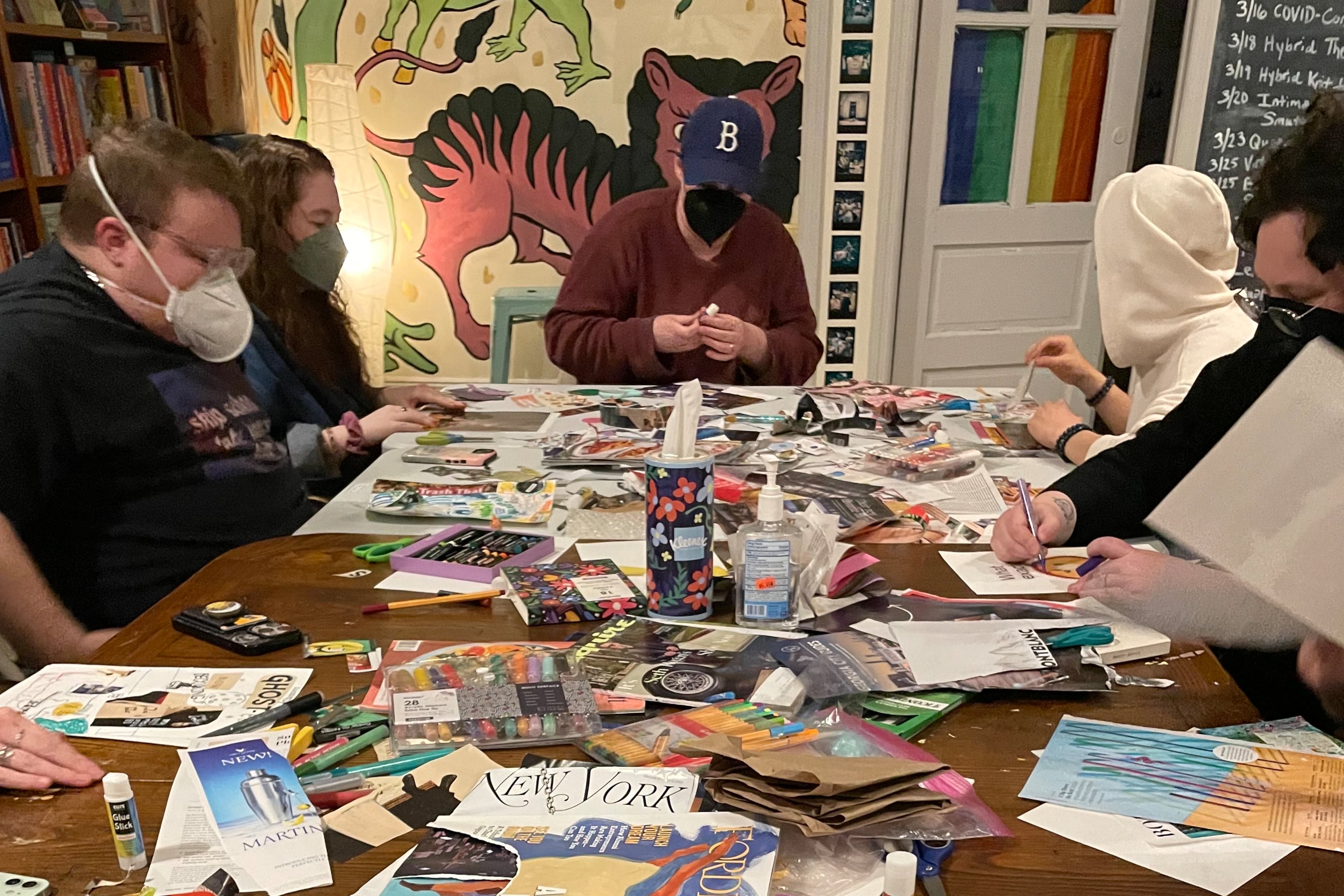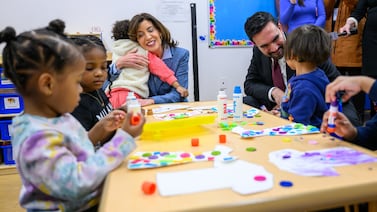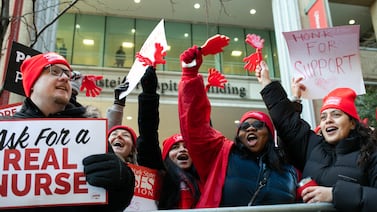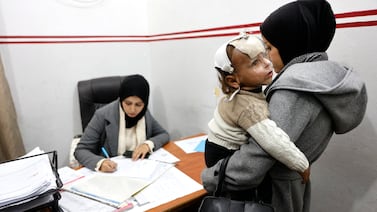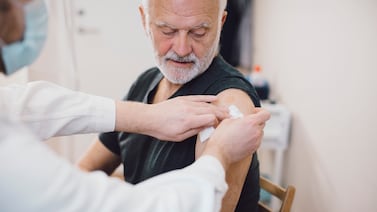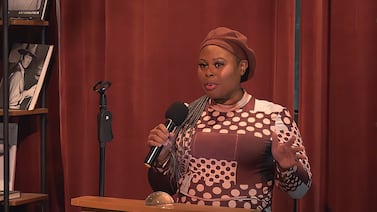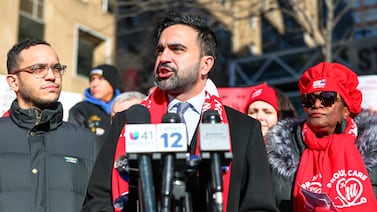Public health, explained: Sign up to receive Healthbeat’s free New York City newsletter here.
On a spring afternoon, Umi Khokhar found herself standing in the hospital room of a patient she had never met in person. But she knew they had no one else to retrieve supplies from home, and she was there to help.
“They mentioned that they really needed some medication from their house, and that if they didn’t receive this medication, they would have to be in the hospital longer, essentially,” Umi said.
The patient’s health had declined, and regular hospital visits are part of their life with a disability, Umi said. She knew that the patient could not get the medication they needed from the hospital.
So Umi picked up the patient’s keys, went to their house and packed up their medication, books, and art supplies to bring back to the hospital. They also gathered the patient’s dirty laundry and dropped it off at a laundromat.
“I was just coming from a place of empathy and the fact that they said that they didn’t have anyone else they can rely on,” said Umi, a web designer and educator based in Woodside, Queens, who founded Queer Disability Aid.
The group of queer New Yorkers with disabilities offers assistance with unskilled and skilled tasks to other queer people with disabilities. Those they serve reach out through help by filling out a Google form linked in Queer Disability Aid’s Instagram bio.
Volunteers provide help calling doctors, pet sitting, raising funds for mobility supports, grocery shopping, laundry, and other errands. There are times when a volunteer who has a specialized skill will offer that – like give a haircut, for example. QDA reimburses transportation fees for volunteers.
It’s a public health service for a group that is particularly susceptible to chronic illnesses and Long Covid.
People who request services pay if they are able, but usually they are provided for free, Umi said. More than 120 volunteers have spent more than 340 hours helping people since Umi started the group in June 2024. Umi spends 20 to 40 hours a week organizing it all, and sometimes filling requests, too.
Uncertain vaccine access stokes worries about Long Covid
Queer Disability Aid serves a community that is worried about Covid and fears that access to vaccinations will be disrupted under changes implemented by the Trump administration.
Federal health agencies are narrowing vaccination recommendations, pushing drugmakers to perform clinical studies, and making other changes that could limit who gets booster shots. Hundreds of people in the United States still die of Covid every week.
Even though people with chronic illnesses would still fall under Food and Drug Administration guidance to receive updated Covid shots, the risk of transmission could still be high if other people are not vaccinated.
A Centers for Disease Control and Prevention survey shows more people in the LGBTQ community have Long Covid than others. And a 2023 study from experts at Central Michigan University shows that queer people have a higher likelihood of suffering with chronic illnesses, which make them more vulnerable to Covid.
Queer Disability Aid keeps events accessible to people who are immunocompromised by requiring masking at its events.
How mutual aid groups improve care for people with disabilities
In New York state, more LGBTQ people suffer with mental illness than their straight counterparts, the Department of Health reported.
University of Manchester research shows the importance of mutual aid groups for those who battle disabilities. One of the researchers, Luan Cassal, found that the groups have helped bridge disparities in disaster care for LGBTQ communities.
For instance, in 2020 at the height of the Covid pandemic, LGBTQ communities in the United Kingdom and Brazil benefitted from LGBTQ support groups providing each other mental health support online.
Because marginalized groups face vulnerabilities in crises due to inequitable treatment — such as the LGBTQ community’s lack of access to food and shelter following the fatal 2010 earthquake in Haiti — mutual aid groups are especially useful as they can fill those gaps, the study found.
Aristotle University of Thessaloniki’s Sotiris Lainas found in a review of psychology papers that mutual aid groups improve the well-being of people who are fighting disabilities.
“They face a two-way exclusion, not only regarding their disability, but also the orientation,” Lainas said. “Find other people with common issues with you and try, because they have ears that they can hear you, they have a sorrow that they can feel you, and together, you can act together to change these things or not to change just to protect yourself and others.”
QDA aims to make events more accessible
Queer Disability Aid hosts support groups at venues with an activity like art, or mapping out a support network with a pen and paper, Umi said.
In the future, the group plans to produce small business market events that are accessible for those who use mobility aids and for those sensitive to noise.
“I’ve been to so many markets where, like if you are in a wheelchair, you just can’t navigate if there’s lots of people,” Umi said.
Like QDA’s other events, masks would also be required, to allow people whose chronic illnesses compromise their immunity to reduce their risk.
“It’s really important to have spaces that are accessible, both in terms of mobility, people who are immunocompromised, people who are neurodivergent as well and might have some sensory overload,” Cassal said. “And that’s important. So we keep people united, and we keep together rather than excluding people from following the expectations of abilities.”
Supplying people the help they need through the mutual aid group brings Umi joy.
“Connecting people who I think sometimes have a hard time finding community is definitely one of the best parts of the role,” Umi said. “I just love seeing our community members engage with each other.”
This story was produced in partnership with the Health & Science Reporting Program at the Craig Newmark Graduate School of Journalism at CUNY.

